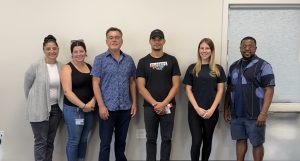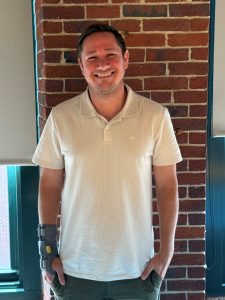Jul
18

Posted by benniefinch on July 18th, 2025
Posted in: Blog, Funded Project
Tags: Funded Projects, Member Spotlight, professional development, recovery, substance use disorder
This article is a guest blog post from Riverbend reporting back about their funded project. Hear how they are supporting recovery through the Recovery Coaching Model in Massachusetts.

Left to Right: Gianna Sandella, Director of Community Outreach, Nicole Cardelle, Assistant Director of Recovery Support Services, Rich Hollett, Director of Recovery Support Services, Niko Cruz, Recovery Housing Specialist, Jade Mellen, Program Director Recovery Cafe Lowell, Gabriel Taylor, Recovery Coach Supervisor
What image comes to mind when I say the word “coach”? A middle-aged man in basketball shorts with a whistle around his neck? Maybe a sporty mom shouting encouragement to a team of little girls chasing a soccer ball? Coaches are supporters, mentors, and teachers. They are guides who help people work towards their goals, whether you’re a six-year-old putting on ice skates for the first time or a forty-five-year-old going for that next promotion.
There’s another definition of “coach”, an older one, that I invite you to consider.
“The very first use of the word ‘coach’ in the English language occurred in the 1500s to refer to a particular kind of carriage… hence the root meaning of the verb ‘to coach’: to convey a valued person from where he or she was to where he or she wanted to be.”
Roger D. Evered & James C. Selman, Coaching and the Art of Management
This is the definition that gets to the heart of the Recovery Coaching model, and that model is what we want to share with you. To be a recovery coach is to help convey a valued person from where they are to where they want to be on their journey of recovery.
Riverbend is proud to have received an NNLM R7 grant to support our “Train the Trainer” project. Before we can tell you about the impact of this grant, let me introduce you to Riverbend.
Riverbend is a private non-profit organization in the Greater Merrimack Valley that provides treatment programming, recovery support services, and outreach to people dealing with substance use disorder and their friends and families. Riverbend’s continuum of care includes clinical programs such as long-term residential houses that focus both on substance use and co-occurring mental health disorders, outpatient care, intensive day treatment programming, as well as first- and second-offender driver diversion programs. We have a robust outreach team that provides harm reduction services, training and education, Narcan, and includes a nurse who provides care to people on the street and in homeless encampments. We also have a thriving recovery support services division, which includes two Peer Recovery Support Centers – Recovery Cafe Lowell and Ray of Light Recovery Cafe in Haverhill (both of which are part of the recovery café network), recovery coaching, and the CCAR-accredited Recovery Coaching Academy which provides intensive trainings for those looking to become certified Recovery Coaches.

Doug Starbird, Associate Chief Clinical Officer
So, what exactly is a Recovery Coach? A Recovery Coach is a trained peer support person with lived experience with both substance use and the recovery journey – who is there to help support individuals as they work to cultivate their own recovery pathway. Recovery Coaches provide support, advocacy, encouragement, help facilitate connections to additional resources, and work with individuals to help them identify the best way forward for themselves. Perhaps most importantly, the role of a Recovery Coach is to be someone who affirms the inherent value and potential of each and every recoveree – regardless of substance use, mental health issues, homelessness, criminal justice involvement or mistakes made – so that they too can recognize and actualize the value and potential within themselves.
Supporting these people and this program is what this NNLM R7 grant was designed to do. The grant allowed us to support four employees in becoming RCA Facilitators. Having more RCA Facilitators allows us to offer the trainings more frequently, which in turn allows us to have more Recovery Coaches available, which of course, allows us to touch more lives and serve more people.
Rich Hollett is the Director of Recovery Support Services at Riverbend, and Nicole Cardelle is the Assistant Director. They are the leaders of Riverbend’s non-clinical peer support services. They are passionate about their work and the Recovery Coaching model, and for both, it seems clear that this work is their calling in life.
Nicole and Rich talked with me about their own journeys and the ways that being a Recovery Coach has impacted their own lives. Nicole began her journey working in a residential treatment facility, and from there, had the opportunity to become a recovery coach/peer mom at HPC Moms Do Care in Lowell, MA. It was in this role that Nicole used her own lived experiences to connect, support, and help others. This is when Nicole began to feel like “this is who I’m meant to be… I love it!”.
Rich talked about his own journey in recovery and how he crafted his own unique path, since the more conventional and widely accepted treatment and recovery options did not resonate with him. After several years into his own recovery, Rich accidentally landed on CCAR’s webpage by luck and felt like “CCAR’s Recovery Coach Academy model… it was designed just for me.” He signed up immediately, became trained and began his first job recovery coaching in an Emergency Department in Lynn, MA.
Both Rich and Nicole talked about how things have fallen into place for them in Lowell at Riverbend (originally Lowell House, Inc.). Certification was new to Massachusetts when they both became certified in 2018, where they were among the first certified recovery coaches in the state. They have both been integrally involved in building the Recovery Support Services arm of the agency almost from the ground up. They’ve opened and managed the Recovery Cafes, provided support and recovery coaching, applied for and been awarded grants to support their work, and worked tirelessly to grow their staff, all with the aim of uplifting those still struggling with SUD or those looking to initiate or sustain long-term recovery.
In conversations with Nicole and Rich, it’s clear how their own experiences in recovery allow them a profound understanding of the work that it takes. As Rich says, “holding each other in loving accountability” is a huge part of the work that they do. Because they have that lived experience to draw on, they’re able to authentically meet people where they’re at and offer deep compassion and understanding that allows them to affirm the inherent value of their recoverees as well as inspire them to engage in their own recovery.
The challenges associated with substance use and misuse continue to be daunting. In Middlesex (MA) county alone, there were over 19,000 substance-rated ER visits in 2024. The need is great and having the ability to offer the incredible and uplifting one-to-one coaching that our certified Recovery Coaches can provide is having a meaningful impact on the communities we serve. This grant allowed us to double the number of Recovery Coach trainings we can provide to the local community, which in turn allows us to support individuals and local organizations in even greater numbers.
NNLM Region 7 is looking forward to hosting a webinar featuring our partners from Riverbend in recognition of Recovery Month in September. More information to come!